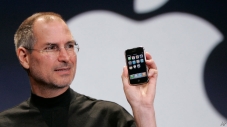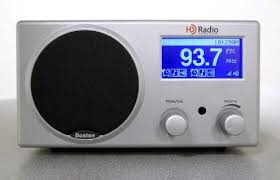 It was 10-years ago this past Thursday that the iPhone went on sale. On that fateful day, I was using a company issued Blackberry Pearl. It was such an amazing upgrade from my old Motorola flip-phone that I got a couple of years earlier.
It was 10-years ago this past Thursday that the iPhone went on sale. On that fateful day, I was using a company issued Blackberry Pearl. It was such an amazing upgrade from my old Motorola flip-phone that I got a couple of years earlier.
Cell Phone Evolution
It was 1983 that Motorola introduced the DynaTAC 8000X Advanced Mobile Phone System. It was with the DynaTAC in his hand that Michael Douglas told the world “greed is good” in the movie “Wall Street.”
This phone could make and receive calls from almost anywhere. But that was it.
I never had one of those phones, my first cell phone was a bag phone that sat in the front seat of my car with a wire running out of a rear window connected to a magnetic antenna on my car’s roof.
Only six years later, the Motorola MicroTAC 9800X would become the first truly portable phone. Having this phone was a real advancement as it now fit onto a belt clip and went everywhere I went. However, I was still using a Palm Pilot to keep track of my calendar, contacts and other notes and a Nikon Coolpix to record radio station events for posterity.
In 2004, I got my first Blackberry and in 2007 I upgraded to a Blackberry Pearl.
None of these phones really changed my life other than they got better at making and receiving calls, sent & received text messages and company emails could be sent and received. I still relied on other single use devices to do the other things in my life.
My 1st iPhone
One of my problems with iPhones were how big they were. I grew to love the size of my Blackberry Pearl and didn’t want to go backwards to a larger phone. (Later I would learn it was the huge cases people put their iPhones into that made them so large, not the phone itself.)
My second Apple device, after my iPod Classic, would be an iPad2, purchased in November 2011. I wasn’t sure why I needed one, but since I was teaching at a university to the next generation of broadcast students, I thought I needed to stay up with the technology.
I quickly fell in love with my iPad and realized I now knew how to fully operate an iPhone. So, in January 2012, I purchased the latest iPhone that had just come out, the iPhone4s. The iPhone4s was actually more compact than my Pearl and I would store it in a leather sheath just as I had with my Pearl.
The iPhone4s WOULD change my life!
The Beginning of the End
The day that Apple introduced the iPhone4s – October 4, 2011 – was one day before the death of former Apple CEO and co-founder Steve Jobs. The “s” stood for Apple’s new voice assistant Siri. (Siri would not be the first intelligent personal assistant but would be the one that would start a new round of innovation giving birth to Amazon’s Alexa and the Voice Activated Devices I wrote about last week.)
Equipped with my new iPhone4s, I quickly converted my entire contact file from Palm to Apple. My calendars – both personal & professional – were converted to my iPhone and iPad. My Nikon Coolpix began to gather dust as all of my pictures would be now taken with my new iPhone4s.
Being new to the Apple ecosystem, I signed up for the iCloud and iTunes match to connect my PC, iPad and iPhone all together. I was surprised to learn that many Apple devotees didn’t use these internet connected systems. But then I didn’t realize they only came on the scene a few months before I got my first iPhone.
Very quickly my iPhone4s replaced my camera, my video camera, my Palm Pilot, my cassette recorder, my note pad, my desk calendar, and even my iPod Classic. It became my way to email, text and make calls. My landline phone was discontinued the day I got my iPhone4s.
My unlimited data plan allowed me to stay connected to Facebook, LinkedIn, Twitter and Google Search. My phone became my resource for breaking news and if severe weather were imminent it would immediately alert me of pending danger.
Would bad weather cancel classes? My iPhone4s would alert me of any delayed opening or closing.
Very quickly my iPhone4s became one of three things I would not leave my house without: those being my wallet, my car keys and my iPhone.
Noteworthy is that Apple has made privacy “a fundamental human right” and is the only consumer-oriented technology giant with a business model not based on sucking up tons of personal data in order to target advertising to consumers, writes the Economist. In fact, this online business magazine says “the end of stand-alone electronic devices, however slick, is coming to an end.”
The End of Single Skill Students
What I’ve seen change in just the last seven years as a broadcast professor are the needs of the broadcasting industry in terms of what they want graduating students to know when they enter the workplace. In a word, EVERYTHING!
They need to be equipped with the “Swiss Army Knife” of skill-sets.
They need to be able to write for broadcast – online web-pages – social media, take pictures, take & edit videos, record & edit audio and so much more. Where once each one of these tasks was a single skill, today’s broadcaster needs to be able to it all. Much as we require of our electronic devices.
Cutting the Cord
When my laptop died, I replaced it with a MacBook Air. When it was time to replace my desktop PC, I bought an iMac. My iPhone4s has been replaced by an iPhone7 (that has as much memory as my MacBook Air) and AirPods. And when I moved to Virginia, I “cut the cord” on cable TV and went with AppleTV.
Everything is tied to the Apple ecosystem – iCloud, iTunes Match and to each other.
What I still enjoy using are my BOSE Wave Radios (I have two of them), my Garmin GPS and my car radio.
However, I know that my students have no such need for anything other than their smartphone.
And they are the people who will determine the future of broadcasting by the choices they make.
For radio the game will be less about numbers and more about attracting and engaging with a specific audience by super-serving their needs, wants and desires to such an extent they will find you on whatever device they choose to listen on.

 This week produced some conflicting economic data. The stock market was setting new records and the
This week produced some conflicting economic data. The stock market was setting new records and the  Wisdom is wonderful thing. Unfortunately, most of us don’t acquire wisdom until we’ve put a few years on the calendar. Let me share some of the wisdom I’ve acquired, much of it from the school of hard knocks. I think I’ve earned my Ph.D. at that school.
Wisdom is wonderful thing. Unfortunately, most of us don’t acquire wisdom until we’ve put a few years on the calendar. Let me share some of the wisdom I’ve acquired, much of it from the school of hard knocks. I think I’ve earned my Ph.D. at that school. Everything you need to know to succeed in life you probably learned by the time you graduated high school. Do you remember your high school days? You probably couldn’t wait to graduate and begin the next chapter of your life. We were all in such a hurry. Many of us were looking forward to going to college. College, we thought, would be what real life was like. It would be a world where real talent is what counts.
Everything you need to know to succeed in life you probably learned by the time you graduated high school. Do you remember your high school days? You probably couldn’t wait to graduate and begin the next chapter of your life. We were all in such a hurry. Many of us were looking forward to going to college. College, we thought, would be what real life was like. It would be a world where real talent is what counts. That was the headline that appeared in the
That was the headline that appeared in the  Every day the radio business and the business of higher education are faced with lots of choices that will affect them in the years ahead. Here are my thoughts about some of the choices they should be making right now.
Every day the radio business and the business of higher education are faced with lots of choices that will affect them in the years ahead. Here are my thoughts about some of the choices they should be making right now. What is the future for jobs in radio in our digitally connected world? Three jobs in particular stand out as being in demand right now and look to be still in demand as radio celebrates its 100th Anniversary in the year 2020. The first won’t surprise anyone, the second is a job that only recently became critical and the third is a job that’s been a part of radio since day one.
What is the future for jobs in radio in our digitally connected world? Three jobs in particular stand out as being in demand right now and look to be still in demand as radio celebrates its 100th Anniversary in the year 2020. The first won’t surprise anyone, the second is a job that only recently became critical and the third is a job that’s been a part of radio since day one. years ago Michael C. Keith entered a small New England college to start a new career. Keith had just spent the past ten years as a professional broadcaster and was now transitioning into the world of teaching. The first thing that he would learn was the only textbooks available at that time were woefully out-of-date. Radio was now format driven and there were no textbooks available in 1986 that were teaching the kind of radio Michael Keith had just left. So, Keith decided to write his own textbook. He called it simply “The Radio Station” and he pitched his manuscript to Focal Press.
years ago Michael C. Keith entered a small New England college to start a new career. Keith had just spent the past ten years as a professional broadcaster and was now transitioning into the world of teaching. The first thing that he would learn was the only textbooks available at that time were woefully out-of-date. Radio was now format driven and there were no textbooks available in 1986 that were teaching the kind of radio Michael Keith had just left. So, Keith decided to write his own textbook. He called it simply “The Radio Station” and he pitched his manuscript to Focal Press.